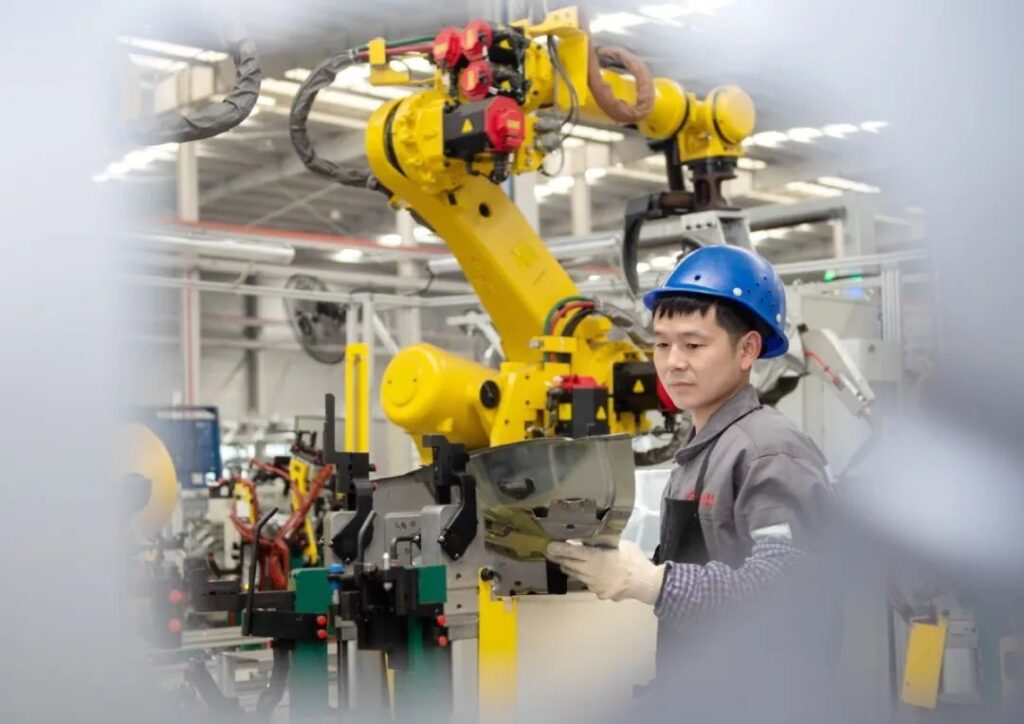Business丨Experts highlight ‘future industries’

China’s thrust on new productivity boosters that can accelerate the development of “future industries “and technologies, and thereby promote modern industrial development, will help stabilize the country’s industrial economy as well as economic growth this year, industry experts said on Thursday after reviewing the latest statements of a minister.
An employee configures a robot at an auto parts plant in Huzhou, Zhejiang province. TAN YUNFENG/FOR CHINA DAILY
“Future industries” is a term used in China to refer to modern and high-tech fields like artificial intelligence and 6G. Compared with traditional productivity tools that are driven by elements like labor, land and capital, new productivity boosters are led by technological innovation and elements like data, industry experts explained.
Future-oriented industries are likely to benefit from expected supportive policies. The authorities concerned are expected to announce big action plans to drive such applications this year, experts said.
They made the comments after Jin Zhuanglong, minister of industry and information technology, said in an interview with People’s Daily that China will formulate policy implementation details to nurture future industries.
AI, humanoid robots, metaverse, next-generation internet, 6G, quantum information and deep sea, air and space figure among China’s new priorities for future advantages.
Jin highlighted the need to develop new productivity boosters and coordinate technological innovation, large-scale development and application scenarios.
AI, for instance, has played a role in the country’s technological revolution and industrial transformation in terms of aspects like research and development and manufacturing, becoming an important driving force for new industrialization, Jin said.
The focus of large models this year will be on applications in production and their deep integration with smart manufacturing, he said.
“China’s blueprint for future industries is becoming clearer this year. Fields like brain-like intelligence, quantum information and genetic technology will likely gain greater support,” said Luo Zhiheng, chief economist of Guangzhou, Guangdong province-based Yuekai Securities.
“Future industries may enter a new phase as detailed policies or action plans are expected from various ministries and commissions concerned,” Luo said.
During the Central Economic Work Conference in December, the country’s leadership set the tone for economic work this year, emphasizing the building of a modern industrial system through technological innovation. This highlighted the crucial role of innovation-driven growth in upgrading the country’s economy.
“It has become clearer that more efforts are expected to be made to encourage companies to achieve breakthroughs in key technologies like chips and overcome other technical bottlenecks this year, amid intensified global competition and geopolitical uncertainties,” said Hong Qunlian, a researcher at the National Development and Reform Commission’s Academy of Macroeconomic Research.
“Without breakthroughs in these areas, it is impossible to achieve industrial upgrade and stable industrial growth,” he said.
Data from the National Bureau of Statistics showed that in the first 11 months of last year, China’s industrial output grew 4.3 percent year-on-year.
Output of the high-tech manufacturing sector rose 6.2-percent year-on-year in November, up 4.4 percentage points from October, the NBS said.
Wang Peng, a researcher at the Beijing Academy of Social Sciences, said the industrial economy continued to stabilize over the past year, thanks to the country’s efforts in developing key technologies in strategically important sectors.
“No doubt, scientific innovation in future-oriented industries and frontier technologies has played an increasingly bigger role in driving economic growth. As new productivity boosters are highlighted, more innovations from emerging industries will empower the real economy this year,” Wang said.
Denis Depoux, global managing director of consultancy Roland Berger, said in an earlier interview with China Daily that the nation’s industrial modernization, huge consumption potential and growing innovation prowess are three strong factors that create a new China story for the world.
“China has demonstrated its innovation capability. It is leapfrogging in several fields, gaining leadership globally in areas like the electric vehicle chain — from batteries to charging infrastructure, photovoltaic panels, wind turbines and telecommunications equipment,” Depoux said.
Reporter: Cheng Yu
Source: China Daily 2024-01-12 10:31

